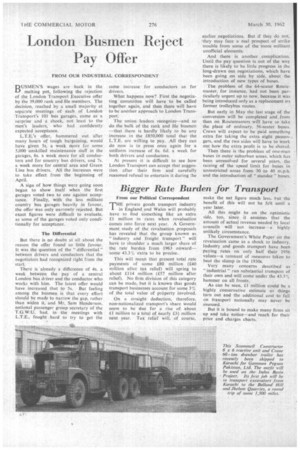London Busmen Reject Pay Offer
Page 38

If you've noticed an error in this article please click here to report it so we can fix it.
FROM OUR INDUSTRIAL CORRESPONDENT
BUSINEN'S wages are back in the melting pot, following the rejection of the London Transport Executive offer by the 39,000 rank and file members. The decision, reached by a small majority at separate meetings of each of London Transport's 101 bus garages, came as a surprise and a shock, not least to the men's leaders; who had confidently expected acceptance.
L.T.E.'s offer, hammered out after many hours of tough bargaining, would have given 5s. a week more for some 5,000 unskilled maintenance staff in the garages, 6s. a week more for all conductors and for country bus drivers, and 7s. a week more for central area and Green Line bus drivers. All the increases were to take effect from the beginning of April.
A sign of how things were going soon began to show itself when the first garages voted two to one against acceptance. Finally, with the less militant country bus garages heavily in favour, the offer was only narrowly rejected. But exact figures were difficult to evaluate, as some of the garages voted only conditionally for acceptance.
The Differential But there is no doubt at all about the reason the offer found so little favour. It was the question of the " differential" between drivers and conductors that the negotiators had recognized right from the start.
There is already a difference of 4s. a week between the pay of a central London bus driver and the conductor who works with him. The latest offer would have increased that to 5s. But feeling among the busmen is that every effort should be made to narrow the gap, rather than widen it, and Mr. Sam Henderson. national passenger group secretary of the T.G.W.U. had, in the meetings with L.T.E., fought hard to try to get the same increase for conductors as for drivers.
What happens now? First the negotiating committee will have to be called together again, and then there will have to be another approach to London Transport.
The union leaders recognize—and so do the bulk of the rank and file busmen —that there is hardly likely to be any increase in the 1850,000 total that the L.T.E. are willing to pay. All they can do now is to press once again for a uniform increase of 6s. 6d. a week for both drivers and conductors.
At present it is difficult to see how London Transport can accept that suggestion after their firm and carefully reasoned refusal to entertain it during the earlier negotiations. But if they do not, they may face a real prospect of strike trouble from some of the more militant unofficial elements.
And there is another complication. Until the pay question is out of the way there is likely to be little progress in the long-drawn out negotiations, which have been going on side by side, about the introduction of new types of buses.
The problem of the 64-seater Routemaster, for instance, had not been particularly urgent up to now, because it was being introduced only as a replacement ma former trolleybus routes.
But early in May the last stage of the conversion will be completed and from then on Routemasters will have to take the place of ordinary, 56-seater buses, Crews will expect to be paid something extra for taking the extra eight passengers, and the two sides will have to work out how the extra profit is to be shared.
Then there is the problem of one-man buses in outer suburban areas, which has been unresolved for several years, the raising of the speed limit for buses in unrestricted areas from 30 to 40 m.p.h. and the introduction of " standee " buses.
































































































































